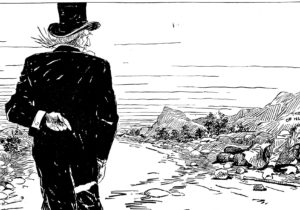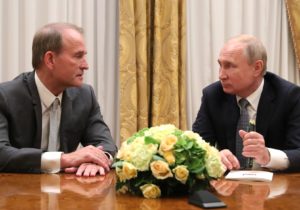Israeli Prime Minister Benjamin Netanyahu was once asked why Israel—a tiny country of 8.5 million people with a GDP of just $317 billion—would send humanitarian aid and relief teams around the world. His response was at once surprising and yet perfectly fitting. “Because we’re a light unto the nations,” he explained. “People say, What is it that you get out of it? And the answer is we’re not getting out of it anything; we’re fulfilling our deepest values.”
Say what you will about Netanyahu—like all politicians, like all people, he has his flaws—but that’s not a bad way to think of foreign aid and humanitarian assistance.
The psalmist tells us, “Those who fear the Lord…have freely scattered their gifts to the poor.” And the story of the Good Samaritan shows us that all people of goodwill are neighbors.
“A man was going down from Jerusalem to Jericho, when he was attacked by robbers,” Jesus began. He was beaten and left for dead. A priest and a Levite saw the man, only to cross the road to avoid him. But a Samaritan “took pity on him,” “bandaged his wounds,” “brought him to an inn and took care of him.” He then paid for the man’s care and recovery. In a sense, this is a portrait of foreign aid in action. It pays to recall, as one commentary explains, that the hero is “a hated foreigner…but Jesus asserted that love knows no national boundaries.”
Moreover, Jesus taught that “to whom much is given, much is expected.” In light of how much we Americans have been given, why would heaven not expect us to answer when the neediest cry out for help?
To be sure, governments are expected to do certain things individuals aren’t expected to do—and shouldn’t do certain things individuals should do. Bearing the sword to protect innocents, maintain order, and carry out justice is a biblical expectation of governments, but for individuals such behavior seems to ignore Christ’s admonishment to put away the sword. Contrariwise, turning the other cheek and dying to self are next to godliness for individuals, but such behavior is next to suicidal for nation-states. However, helping those in need and sharing from our abundance are things God expects of individuals and nations alike.
“Abundance” is the operative word. At nearly $20 trillion, America’s GDP is enormous. How enormous? America represents 24.5 percent of global GDP. California’s economy alone is the sixth-largest on earth. The federal government literally wastes $124.7 billion on improper payments annually—more than the entire GDP of Kuwait.
None of this is to suggest that presidents should put the interests and needs of other nations ahead of US interests. However, helping nations in need often serves America’s most important interests while burnishing America’s highest ideals.
It pays to recall that the Marshall Plan prevented Western Europe from sliding into the prison yard of communism, created a massive market for US goods and services, and transformed Europe from an incubator of world wars into a partnership of peace and prosperity.
The Berlin Airlift not only rescued a city from starvation and tyranny, but also dealt a blow to Stalin.
Those 450-plus Cold War-era airlifts and relief operations, referenced in the first installment of this series, ensured that foreign governments would “be receptive to Americans politically, economically and militarily,” as an Air Force analysis points out.
Getting Japan back on its feet after the 2011 earthquake and tsunami helped an ally return to the important work of regional deterrence.
Assisting the Philippines after Typhoon Haiyan in 2013 sent “a signal to all of Southeast Asia, to Asia, that the U.S. is serious about its presence.”
America’s response to the Ebola outbreak stabilized the region, prevented the killer virus from spreading into Europe and the Americas, and smothered a global panic.
Real schools with real textbooks and real teachers are an antidote to the lies spewed by extremist madrassas. Likewise, providing medicine and clean water to the friendless, forgotten corners of Africa serves as an inoculation against jihadism. “Societies mired in disease breed hopelessness and despair,” as President George W. Bush recently observed, in a strong echo of President Harry Truman’s reference to the seeds of totalitarianism, “leaving people ripe for recruitment by extremists.” Moreover, these forms of foreign aid counter the jihadist narrative that America is oblivious and selfish.
In short, foreign aid is an example of enlightened self-interest. But don’t take my word for it.
President Dwight Eisenhower, the no-nonsense general of generals, saw foreign assistance as “an investment in our present safety, in our future strength and growth, and in the growth of freedom throughout the world.”
In 2013, responding to reports that aid and diplomatic programs were on the chopping block, then-General James Mattis bluntly warned Congress, “If you don’t fully fund the State Department, then I need to buy more ammunition.”
A group of 120 retired flag officers recently signed an open letter arguing that “the State Department, USAID, Millennium Challenge Corporation, Peace Corps and other development agencies are critical to preventing conflict and reducing the need to put our men and women in uniform in harm’s way.”
Countering President Trump’s suggestion that “foreign-assistance dollars…only go to America’s friends,” Admiral James Stavridis and General Anthony Zinni add, “Foreign aid is not a reward for good behavior. It is a critical tool to advance American interests around the world and address the drivers of conflict and instability.”
The generals and admirals know something that too many politicians never take the time to consider: a foreign policy defined purely by self-interest—by zero-sum transactions, by pennywise cuts and poll-tested applause lines, by soothing promises to focus on nation-building at home and put America first—has the effect of undermining America’s interests. How? The liberal international order America began building after World War II didn’t emerge by accident and doesn’t endure by magic. It depends on Americans and others blessed to live in peace and prosperity using their wealth and wherewithal to enforce international norms of behavior, deter aggressive states, and, yes, help neighbors in need. Foreign aid and humanitarian assistance serve as lubricants for this liberal order—an order that benefits America more than any other nation.
—
Alan W. Dowd is a contributing editor to Providence and a senior fellow with the Sagamore Institute Center for America’s Purpose.
Photo Credit: A child in Yemen eats a ready-to-use therapeutic food bag from USAID. UNICEF photo, via Flickr.







 Sponsor a student for Christianity & National Security 2024
Sponsor a student for Christianity & National Security 2024